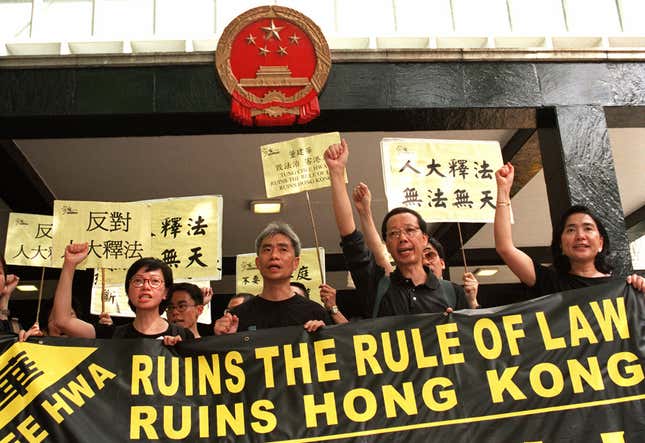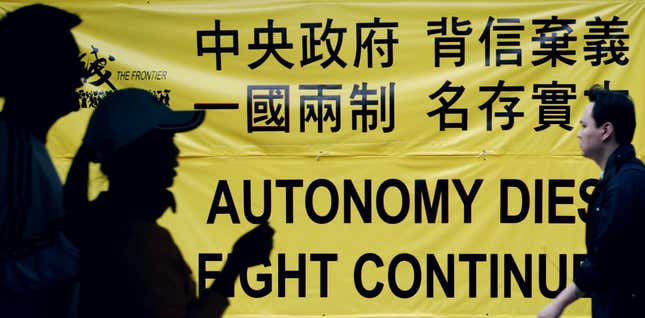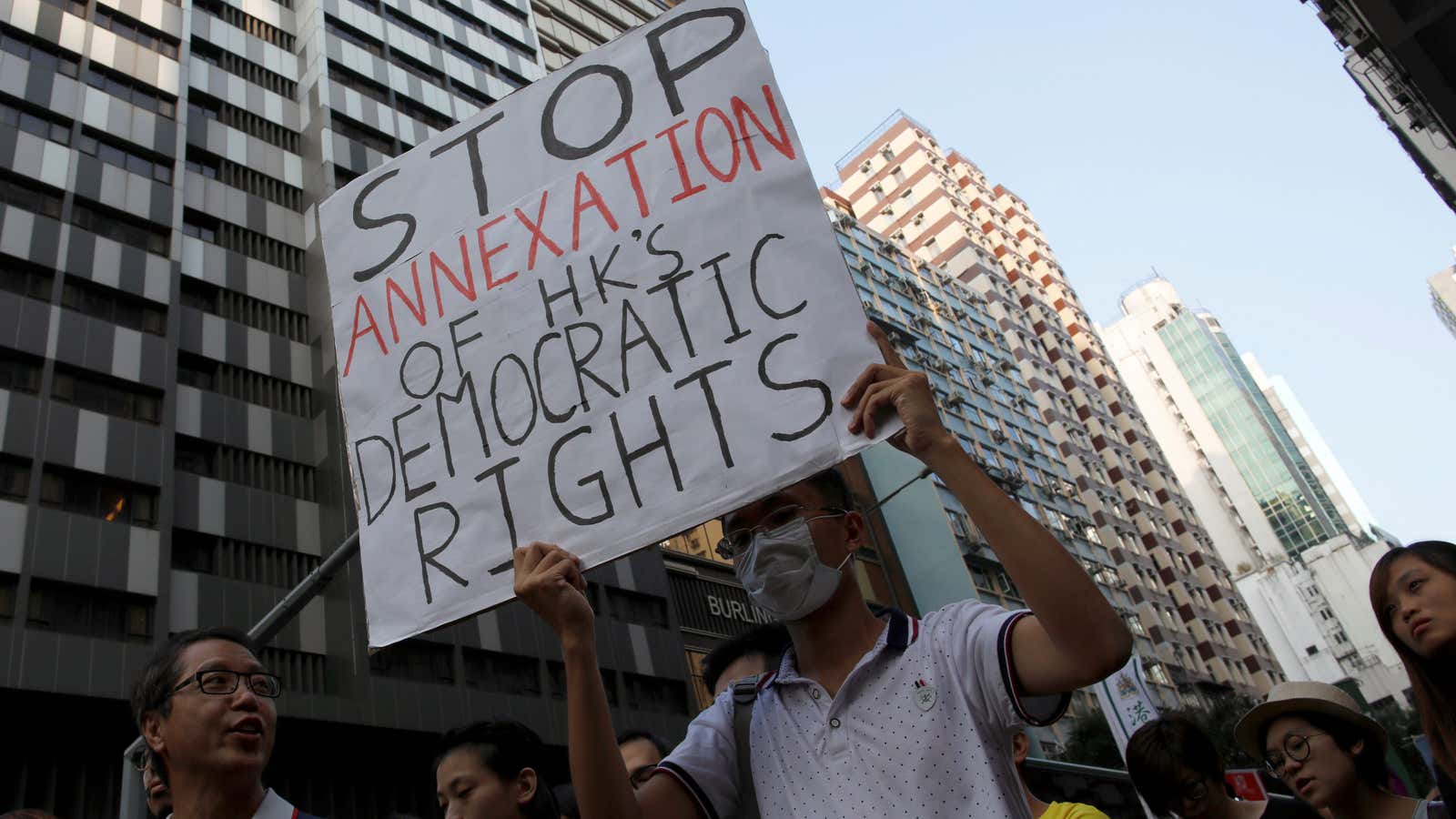Bejing is curtailing Hong Kong’s judicial independence by delivering an interpretation of the Basic Law, the city’s mini-constitution that protects its special “one country, two systems” status.
China’s top legislative body, the Standing committee of the National People’s Congress (NPCSC), endorsed an interpretation of Article 104 of the Basic Law today (Nov. 7) which states that lawmakers must swear allegiance to Hong Kong as part of China, describes how they should do it, and the consequences of failing to do so. It could effectively bar two elected politicians, Leung Chung-hang and Yau Wai-ching, after their controversial actions during their swearing-in ceremony in October.
When assuming office, lawmakers and principal officials and others must “correctly, completely, and solemnly” swear a scripted oath, including the part saying “I will uphold the Basic Law of the Hong Kong Special Administrative Region of the People’s Republic of China, bear allegiance to the Hong Kong Special Administrative Region of the People’s Republic of China,” the interpretation says.
If lawmakers and others reject to take the oath, or purposefully read their own lines or take the oath “not genuinely or solemnly,” they will be deprived of their right to assume office—and there is no chance to retake it.
This kind of interference in Hong Kong’s judicial independence is rare but not unheard of.
Article 158 of the Basic Law grants the NPCSC the power to interpret the law—but only under three criteria, writes Cora Chan, associate professor of Law at the University of Hong Kong. First, the interpretation must concern affairs that are the responsibility of Beijing or the relationship between Beijing and Hong Kong. Second, it must be issued at the request of the Hong Kong Court of Final Appeal (CFA), except when concerning China’s sovereignty. Third, “the interpretation is an interpretation rather than an amendment of the law.”
Of the four interpretations the NPCSC issued in the past, only the fourth meets all three criteria, she said, and Beijing is not adhering to principles of the law. “In line with Leninist legal tradition, the law is viewed by the Chinese Government as a mere tool to facilitate the Party agenda,” notes Chan.
Here’s a brief history of how the NPCSC has interpreted the law in the past.
The right of abode, 1999
After the 1997 handover, many mainland-born children of Hong Kong permanent residents, who previously were smuggled to Hong Kong or over-stayed their visas, came to immigration authorities to claim their right to abode in the territory under Article 24. One key question: Were children born on the mainland before their parents became permanent residents of Hong Kong qualified?
In the Ng Ka Ling and Chan Kam Nga cases in 1999, the CFA ruled that all children born of permanent residents, no matter when they were born, had the right of abode in Hong Kong. But the Hong Kong government estimated that 1.6 million mainland residents would immigrate to Hong Kong over ten years if the CFA’s decision was implemented, a burden too onerous for the city to take.
As a result, then chief executive Tung Chee Hwa decided to seek interpretation of two Basic Law provisions concerning the right of abode from the NPCSC. The NPCSC overturned the CFA’s judgement saying it was “not consistent with the legislative intent.” Its own interpretation (pdf) stated that children born outside Hong Kong will be qualified for the right of abode if at least one of their parents has earned a permanent resident status at the time of their birth. It also ruled that “right of abode applicants” must apply for permission from mainland authorities before entry into Hong Kong, essentially taking power away from the Hong Kong government.
Hundreds of Hong Kong lawyers protested against the interpretation in a silent march, for fear that it could set a precedent for Beijing to overturn any ruling unfavorable to the local and central governments.

The election of the chief executive, 2004
Article 45 of the Basic Law states that Hong Kong’s top official, the chief executive, will ultimately be elected by universal suffrage. Two annexes to the Basic Law laid out how electoral reform should be carried out to achieve the goal, including that amendments to election methods should be passed by the majority of Hong Kong’s Legislative Council and eventually approved by the NPCSC.
In 2004, the NPCSC issued an interpretation (pdf) of the two annexes, entirely of its own volition. The interpretation added two new rules to the process, saying the chief executive must first report to the NPCSC about any amendment to the method of election, and the NPCSC can decide whether it is necessary. This effectively curbed Hong Kong’s autonomy when it comes to reforming its own democratic process.
Again, the interpretation sparked protests.

Replacing a chief executive, 2005
Chief executive Tung Chee-hwa asked to resign from the office in March of 2005, two years before fulfilling his second five-year term, citing poor health.
Because neither the Basic Law (Article 53) nor the Chief Executive Election Ordinance specified what should happen next, the acting chief executive, Donald Tsang, who stepped into his spot, requested an interpretation of the Basic Law and proposed that the succeeding chief executive should fulfill the remainder of Tung’s term.
The NPCSC interpreted the law to agree with Tsang in this instance, but said the election ordinance should be amended to determine what happens in the future.
Diplomatic immunity, 2011
In 2008, the Democratic Republic of Congo (Congo) offered mining rights to China Railway Group in return for millions of dollars in entry fees. US company FG Hemisphere Associates LLC (FG), a creditor to the Congo, wanted to seize $102 million of those fees from China Railway Group to satisfy debts owed Congo owed.
Congo took its case to Hong Kong courts in 2010, which ruled in favor of FG, saying states do not have strict immunity in commercial proceedings. Congo then took the case to Hong Kong’s Court of Final Appeal, which in 2011 requested that the NPCSC in Beijing interpret the relevant clauses in the Basic Law. Beijing ruled that because the central government was responsible for Hong Kong’s foreign affairs, Congo should have the right to diplomatic immunity.
Taking the oath for office, 2016
Beijing’s latest intervention comes after Leung and Yau of the Youngspiration party declared Hong Kong a nation and used a racial slur to refer to China during their swearing-in ceremony on Oct. 12. Previously, the Hong Kong government had filed a judicial review application to ban the two from re-taking their oaths. The Hong Kong High Court has yet to deliver its judgment.
Beijing’s announcement on Nov. 7 is expected to ignite political passions in an already turbulent city. Thousands of Hong Kongers gathered outside the liaison office on Sunday (Nov. 6) to protest against Beijing’s interpretation of the Basic Law. Police clashed with protesters and used pepper spray to disperse them. Hong Kong’s legal sector is set to hold a silent march on Tuesday (Nov. 8) to protest against the intervention.
